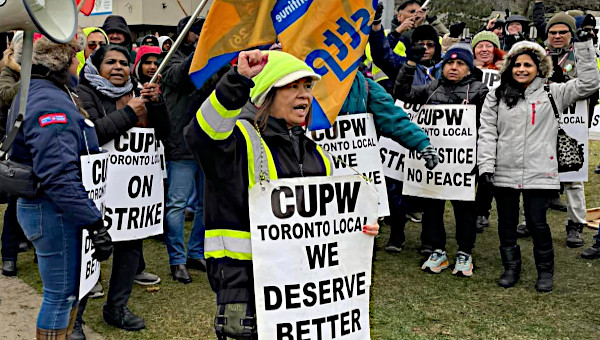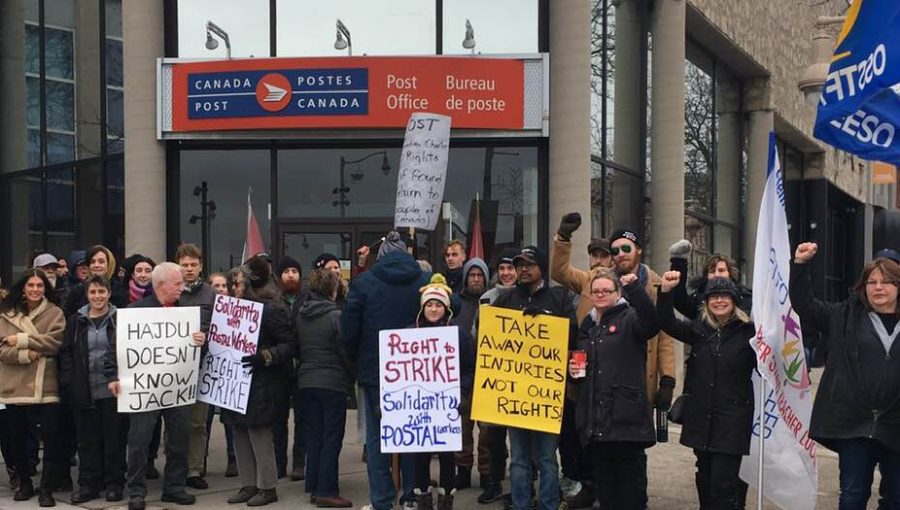Battling Austerity: CUPW Hits the Picket Lines
June 2, 2011 — Negotiations Alert: Strike Begins Tonight in Winnipeg.
Urban Postal Unit Negotiations (2011) / News Alert
The strike will begin at 11:59 p.m. EDT in Winnipeg (10:59 p.m. CDT). The Winnipeg local will be on strike for 24 hours, after which the strike will continue in other locations to be announced later.
The purpose of this strike activity is to encourage Canada Post Corporation to abandon their proposals for significant concessions and instead negotiate solutions to the very real problems that are being experienced by 48,000 postal workers.
Winnipeg has been chosen as the location for the first strike activity because it was the first city to be impacted by Canada Post’s modernization program. The results have been a sharp deterioration of service to the public as well as a host of health and safety problems experienced by postal workers due to the new work methods and equipment.
CUPW has negotiations demands designed to resolve these problems and we want Canada Post to address them. •

Letter of Support
From Socialist Project
As the days and hours count down, Socialist Project members wish to add our voices of solidarity to those of labour, community and other organizations committed to supporting you and your members against the attacks of Canada Post Corporation in this round of bargaining.
Employers and governments have carried out the same kind of attacks on other workers and unions as austerity initiatives placed firmly on the backs of workers are promoted as a way out of the economic crisis. This includes massive attacks on public services and public sector unions. So it is with the postal service and this is reflected in the current round of negotiations between Canada Post and CUPW.
On the one hand CPC has advanced a conception of the Post Office that demands a two-tiered system, with newly hired workers forced to accept wages and benefits substantially less than current workers, in addition to reducing benefits for current workers – most notoriously through introducing a Short Term Disability Plan to reduce and replace long-secured sick leave benefits. It has introduced a $2.5-billion “Modern Post” initiative that contains a subversive virus geared to reducing the work force by thousands of positions and forcing delivery methods seriously compromising the health and safety of letter carriers.
On the other hand, CUPW has mobilized its membership in support of a conception of the Post Office that has a “Modern Post” initiative requiring innovation and the development of new services to protect employment and meet public needs such as expanding door-to-door delivery, providing banking and financial services (especially in remote locations) and contracting in work that could be done by its own workers. The Union also includes in this conception decent wages and benefits, greater respect for and recognition of human rights, a new emphasis on health and safety and elimination of hazardous work methods, among other items.
CUPW over many years has consistently fought for the goals it has advanced in these negotiations and has enjoyed huge support amongst its membership. Now, with the lucid and forward-looking program it has envisaged and promoted for an expanded public postal service, it deserves the support of the labour movement, community organizations and the public for its steadfast resistance to the neoliberal push toward privatization and the race to the bottom for the majority of workers.
Just as importantly, Socialist Project recognizes the leadership that CUPW has given to the struggle for a strengthened and militant labour movement domestically, to promote solidarity among workers internationally, and to stand firmly on the side of those who are marginalized and vulnerable in our own society.
For all these reasons, we are convinced it is necessary for all of us to ensure CUPW is not isolated as a result of the assault of the Corporation, especially given that the new majority Conservative government is likely to enter into fray in this, its first opportunity to crack down on a public sector union. Building community support for CUPW is crucial in this battle, and Socialist Project will do whatever it can to assist in this.
We stand with you in your important struggle for a fair collective agreement without concessions and for an expanded public postal service capable of, and committed to sharing the benefits of modernization with the public and its workers. •
In Solidarity,
The Socialist Project
Five Reasons to Support Postal Workers
Jesse McLaren
The Canadian Union of Postal Workers (CUPW) has filed notice to strike at 11:59 p.m. June 2, to defend public postal service and stop massive concessions that scapegoat workers for the economic crisis. Postal workers have stood up for many social justice issues, and their strike could trigger broader opposition to Harper’s austerity agenda. They have voted almost 95 per cent for a strike mandate, and here are five reasons why solidarity needs to receive an equally strong mandate.

1) Postal workers are under attack
In its drive to make work more ‘modern’ and ‘efficient’ (i.e. profitable), Canada Post Corporation (CPC) is imposing working conditions that threaten the health and safety of its workers. According to Bob Tyre, president of the Winnipeg local of CUPW,
“You’re walking with different shapes and sizes balanced in your arm, with another in your hand. It obscures your feet. You can’t see where you’re walking, and you’re up and down stairs all day. You have to hold your arm rigid and balance the load while you’re walking. It’s caused a lot of slip and fall injuries, a lot of shoulder, arm, and neck pain.”
Now Canada Post is trying to roll back the compensation for this dangerous work. According to CUPW president Denis Lemelin,
“The Corporation wants to pay new employees 30 per cent less. It wants to reduce their benefits, weaken their job security and provide an inferior pension. It also wants to attack retiree benefits and sick leave, and turn back the clock on many other contract provisions.”
An injury to one is an injury to all, so we need to support the postal workers’ defense of healthy work conditions and decent pay.
2) Postal workers are standing up for good public services
The mainstream media are trying to pit postal workers against those who depend on postal service. But it’s Canada Post Corporation that has been cutting services, closing offices, and trying to privatize postal services; former CEO Moya Greene left Canada Post to continue pushing privatization on Royal Mail in Britain.
Meanwhile, CUPW has a history of linking good jobs with good services, organizing against rural post office closures alongside unionization for rural and suburban mail carriers. During this round of negotiations CUPW wants to regularize temporary employees and increase the number of full-time workers, while increasing door-to-door delivery and increase staffing at postal outlets. If we want a strong public postal service, we need to support those who provide it and those who are taking a stand to defend it.
3) This is part of a broader austerity agenda
Despite making profits for the past 16 years – including $281-million in 2009, and having the highest paid public service bureaucrat – Canada Post Corporation is blaming workers. This is part of a broader austerity agenda to make ordinary people pay for the economic crisis they did not create (For more on this, visit the rabble tv interview with labour specialist Philip Jennins). As Lynn Bue, CUPW’s second national vice-president stated, “This is a fight against an ideology from the government, from banks, that big businesses should make more, and people should live on poverty wages.”
Prime Minister Harper used the G20 meeting last year to push an austerity agenda, and this week is visiting Greece to support austerity there – which includes privatization, massive cuts to social services, layoffs and attacks on pensions. That’s what Harper wants to bring to Canada and the CUPW strike is his first obstacle. A defeat for CUPW will be a victory for Harper and his corporate backers across the country. A victory for CUPW will build unity and confidence for others to resist the austerity agenda. This is a fight for all of us.
4) Postal workers stood up for us. it’s time for us to stand up with them
Postal workers have a long history of standing up for women’s rights, civil liberties, peace and justice. This year is the 30th anniversary of CUPW’s strike for paid maternity leave. Following the lead of the Common Front of public sector workers in Quebec, postal workers struck for 42 days in 1981 and became the first federal union to win paid maternity leave – encouraging others to demand this basic right.
CUPW was the first Canadian union to boycott South African Apartheid, and the first to join the BDS campaign against Israeli Apartheid, in addition to organizing mail for the Canada/Quebec Boat to Gaza. CUPW has also been part of the campaign to oppose secret trials in Canada, and oppose the war in Afghanistan.
More broadly, the labour movement has been central to Medicare and abortion rights, opposing the Iraq War, and standing up against austerity – from the G20 protest last year to last month’s protest against Toronto mayor Rob Ford. Now’s the time for all of us to reciprocate this solidarity.
5) This strike could trigger broader opposition to Harper
There is tremendous ideological resistance to the Harper agenda – from majority support for Medicare, abortion rights, and war resisters, to majority opposition to the war on Afghanistan, fighter jets and corporate tax cuts. May 2 saw this translate into political resistance as people across Canada and Quebec gave a historic mandate to the NDP opposition, marking a surge for the left from coast to coast. But with a Harper majority, the Official Opposition can’t win on its own in Parliament, it needs opposition in the streets and workplaces. The postal strike offers the chance to connect the “orange wave” of political resistance to economic resistance against the Harper agenda. This can lay the foundation for future struggles, as developments in Egypt show.
In 2006 – after years of opposition to occupations of Palestine and Iraq, and the beginnings of opposition to Egyptian dictator Hosni Mubarak – women textile workers in Mahalla went on strike, triggering a wave of economic resistance that amplified political and ideological resistance. This strike wave planted the seeds for the Egyptian revolution that blossomed this year, further strikes by workers in Mahalla and elsewhere finally drove Mubarak from power, and Egyptian workers are continuing the revolution by organizing independent trade unions and continuing to strike for better conditions.
People across Canada and Quebec have been inspired by resistance from Egypt to Wisconsin, and hope for similar resistance here. We’ve seen the beginnings of political resistance against austerity: ten thousand mobilized in Hamilton on January 26, 75,000 in Montreal on March 20, ten thousand more in Toronto on April 9 and then 2 million more from coast to coast voted for the NDP on May 2. Now we have the chance to have our own Mahalla, a strike that can build from previous struggles, deepen solidarity and strength across Canada and Quebec, and take opposition to Harper to a whole new level.
- To send a letter to Canada Post Corporation and find out how else you can help visit CUPW’s site.
- Put support posters in your window or on street posts – copy the image at the top of this article or download others at the solidarity site Support Postal Workers.
- Write a letter to the editor of your local paper, or call your local radio station, to explain why you support postal workers.
- Visit your local picket line to show solidarity.
- Send solidarity messages or strike support funds to CUPW from your labour/student union, community organization or faith group. •
Jesse McLaren is a physician, activist and blogger at yourheartsontheleft.blogspot.com where this article first appeared.
What’s at Stake at Canada Post?
Cindy McCallum Miller
Canadians embrace the urban myth that postal workers strike regularly, usually at Christmas and always over money. That’s as far from the truth as believing Stephen Harper is a feminist. The last pan-Canadian strike by the Canadian Union of Postal Workers (CUPW) was in 1997 but that will soon change.
CUPW commenced negotiations for its urban bargaining unit in October 2010. Within hours of presenting their demands to the union’s bargaining committee, management representatives met with members at work, promoting the corporation’s proposals in a well-coordinated campaign to cause confusion and division among the membership. Canada Post Corporation (CPC) intends to roll back decades of progress and introduce a new category of more highly exploited workers into the urban workforce. They are overtly encouraging existing employees to sacrifice their future co-workers in the name of management’s “Modern Post” scheme.

Everywhere we look we can see how corporations and governments are attempting to force concessions on workers and attack fundamental principles of workplace safety, job and economic security, reducing wages and benefits to an unacceptable level. What’s happening at Canada Post is no exception. CPC wants to gut our collective agreement for the next wave of workers as they plan for a future where workers have weaker rights, benefits and protection.
With sixteen consecutive profitable years for CPC and the Modern Post as the backdrop to negotiations, CUPW’s demands are simple. They fall under the themes of respect, equality and the right to share in the benefits of technology. In contrast, CPC wants to roll portions of our collective agreement back to the 1970s.
CPC intends to replace our long-held sick leave credit system with a drastically inferior short term disability (STD) plan controlled by the financial firm Manulife. Already imposed on other CPC bargaining units, the STD plan has generated numerous complaints and complications and invades medical privacy. CPC plans to penalize injured workers by reducing compensation to 75% of our income at the same time as new equipment and work methods are being introduced, which will lead to more work-related injuries for postal workers.
Another important goal of CPC is to change the collective agreement so that employees hired after the signing of the new contract would be paid at a much lower rate and be required to work seven years to reach the same maximum rate that current employees earn. New employees would also have to work longer before seeing an increase in vacation leave, and would have an inferior pension plan. CPC also plans to reduce the maximum amount of vacation time for postal workers from seven weeks to six weeks for workers with 28 years of service. These concessions violate CUPW’s fundamental principle of equality.
The stakes are high for CUPW, the labour movement and the future of public services, including the post office. During recent minority Tory governments, Harper’s ministers said they had no plans to privatize the post office, but allowed partial deregulation, preparing for the future. CUPW’s diligence in working with communities has been an important strategy to counter attempts by capitalist think-tanks to diminish the importance of postal service. Now that the Tories have a majority, we will see what they really want to do to postal services.
The Modern Post’s focus is serving large volume mailer corporations. CUPW’s focus is ensuring the people of Canada and Quebec have access to quality service that meets their diverse needs. Canada Post’s transformation of the post office into “the Modern Post” includes new equipment, delivery methods and reduced labour costs. Winnipeg’s new processing plant was slated to be the corporation’s flagship, the first centre to have all aspects of the transformation implemented. Despite union objections, CPC imposed a fatally flawed “multiple bundle” delivery model on letter carriers, forcing workers to work unsafely, balancing bulky, oversize mail on their arms while they carry letters and ad-mail in their hands. Groups of Winnipeg carriers rebelled against the forced conversion to the new method by walking off the job on Nov. 22, 2010, sparking a spirit of resistance among postal workers across Canada and Quebec.
On May 17, CPC presented a new proposal showing negligible movement. CPC appears ready to gamble on whether or not the members will act on the record-high 95% strike mandate to fight for our future. With the election of a majority Conservative government, perhaps management believes there is an opportunity to achieve their goals by having parliament impose them through legislation?
Unions are the only entities capable of blocking the dismantling of our rights and social infrastructure but in order to do that we have to mobilize our membership to take on the government’s agenda. At what point does labour say enough is enough and really mean it? This is the first pan-Canadian labour confrontation in post-election Harper Canada. If CPC obtains the concessions they seek, who is next? CPC anticipates an immediate flood of retirements and many militants of the 1980s have already gone. The leaderships of other unions are supporting CUPW in this struggle but the test will be to see how that support will manifest itself.
CUPW faces many challenges. The majority of members have never experienced a lengthy strike, and in many cases have never taken strike action. The combination of inexperience at the rank and file level of the union, the virulent animosity demonstrated by CPC management and an anti-labour government create an unpredictable situation for the union. This round of bargaining will make an indelible mark on the future of the post office. The determination and strength of the membership will be the key to what that future looks like. •
Cindy McCallum Miller is a long-time union activist and former National Director for the Prairie Region of CUPW who is currently a rank and file postal worker in Castlegar, BC. This article first appeared on the New Socialist Webzine.





